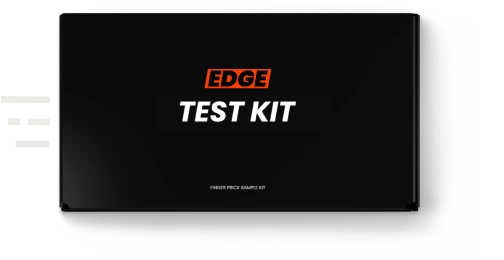
Athletics
Why Does Your Body Need Recovery Time?
Recovery is something so many of us athletes struggle with, often driven by the ‘more is better’ motto. In reality, this is far from the truth.
5 mins read
Published on
October 30, 2020
Written by
EDGE
Share this article
Here at Edge, we know recovery covers far more ground than one might think, it is not simply ‘post-workout recovery’, or doing ‘recovery exercises’. It comes down to sleep, nutrition, lifestyle, and structure, all of which play into giving your body the time it needs with the right tools.
WHAT HAPPENS IF YOU DON’T BUILD IN RECOVERY TIME?
Let’s start with what happens if you don’t recover, especially when following a high volume training plan. Not allowing enough recovery time can actually have the opposite effect to that of the desired, meaning decreased performance and potentially a case of overtraining syndrome. This can compromise your immune system, and leave you feeling fatigued, exhausted, and quite frankly not enjoying something you should!
‘Recovery from exercise refers to the time period between the end of a bout of exercise and the subsequent return to a resting or recovered state. It also refers to specific physiological processes or states occurring after exercise that is distinct from the physiology of either the exercising or the resting states.’1
The recovery phase allows us to adapt to the stress associated with exercise, replenish muscle glycogen (energy stores) and provide time for the body tissue to repair. This is to ensure we can progress with our training and come back stronger.
TYPES OF SPORTS RECOVERY
There are two types of recovery – short-term and long-term:
-
Short-term or immediate recovery is the period after exercise. This is the most common form of recovery and occurs within hours after an exercise session or event. Short-term recovery includes low-intensity exercise after working out and during the cool-down phase, perhaps a slow jog or easy cycle after an intense session or race.
-
Long-term recovery refers to recovery periods that are built in to a seasonal training schedule and may include days or weeks incorporated into an annual athletic program.
IMPORTANCE OF SLEEP
On top of that, sleep is an area that should not be skimped on. Athletes who don’t give this element enough attention are at risk of losing aerobic endurance, and may even experience small changes in hormones which can lead to high levels of cortisol (the stress hormone) and a decrease in human growth hormone, which is active during tissue and muscle repair.
BENEFITS OF RECOVERY
Recovery is especially important for athletes, as often their career depends on their performance, and if they have to take time out from competing or training it can affect contracts and long term work, as well as impact race goals. Recovering well is a small price to pay in return.
Not only this, recovering right now will ensure you are able to progress with the career long past an age you thought once possible, and continue training, something you enjoy even once your professional career is over.
WHAT IS THE FASTEST WAY TO RECOVER?
This one is pretty personal. Some argue over passive vs active recovery, others over the age-old question ‘is it ok to do nothing’, or is walking good for muscle recovery?
The answer is as stated above, whatever works for you. Some swear by Epsom salt baths, others take naps after big sessions. Both of these induce the body into a calmer state and therefore can claim to support recovery.
If you ask us, a lot of this comes down to knowing your body, becoming as in tune as you possibly can. If you’re not recovering whilst eating right, getting adequate sleep, and taking enough time off it may be time to look a little deeper.
We suggest exploring the tests on our site and the options around building your own test. With this, we can look at your Creatine Kinase and eGFR, as well as other biomarkers which will help us determine why it is you’re not recovering at the rate you should.
Whilst we cannot guarantee that these methods will work for you, we can make a few suggestions when it comes to recovering well and prolonging optimal performance.
The first would be to reduce time in a stressed state, and we don’t just mean physically, mentally too. This means avoiding work stress, life stress, and relationship stress as well as stress that comes from the exercise itself.
We also suggest avoiding too much time spent on your feet. Whilst lots vouch for active recovery, otherwise known as easy runs, cycles, or walks there’s a lot to be said for simple time off feet and on the sofa.
FOOD FOR REFUELLING
Finally, food is key. Some post-session recovery dishes our in house dietitian Renee McGregor recommends are:
BANANA & NUT BUTTER SANDWICH
Some flavours just go together naturally. Bananas and nuts are one such combination, so we have brought them together here in this nourishing snack.
Serves 1
Preparation time: 5 minutes
- 1 banana
- 2 tsp nut butter of your choice
1.Slice the banana in half lengthways.
2.Spread the Nut Butter across one half of the banana and then replace the top like a sandwich.
3. This snack can be eaten straight away or wrapped and transported for later.
Nutrition facts (per serving):
- Calories: 169
- Carbohydrate: 29g
- Protein: 3.4g
- Fat: 6g (of which saturates 0.6g)
SUMMER FRUIT SMOOTHIE
A refreshing smoothie full of summer berries that are known for their antioxidant properties and ideal for recovery. Additionally, the tart cherry juice has shown to reduce oxidative stress caused by high-intensity training.
Serves: 1
Preparation time: 5 minutes
- 200g mixed frozen berries
- 100g fat-free Greek yogurt
- 1 handful of ice
- 150ml skimmed milk
- 200ml tart cherry juice
- 10ml honey
1. Put all the ingredients in a blender and blend until smooth.
2. Serve straight away.
Nutrition facts (per smoothie)
- Calories: 300
- Carbohydrate: 55g
- Protein: 10g
- Fat: 0g (of which saturates 0g)
EASY FISH & CHIPS
Fish and chips is a good way to replace glycogen stores and electrolytes in the form of salt. By serving the chips/fries with fish, you add protein to help with repair and recovery.
Serves 4
Preparation time: 15 minutes
- 4 fillets of any white or oily fish
- Zest and juice of 1 lemon
- 2 large baking potatoes (about 570g total weight), sliced into wedges
- 1 sweet potato, about 300g, sliced into wedges
- 1 tbsp rapeseed/canola oil
- 1⁄2 tsp dried Italian herbs
- Sea salt and freshly ground black pepper
For the Mushy Peas:
- 300g/4 cups frozen peas
- 1 tbsp fat-free plain yogurt
For the Lemon Mayonnaise:
- 2 tbsp fat-free plain yogurt
- 1 tbsp low-fat mayonnaise
- Juice of 1⁄2 lemon
1. Preheat the oven to 180°C/350°F/Gas 4.
2. Put the fish on a baking sheet and sprinkle with the lemon zest and juice.
3. Put the potato and sweet potato wedges on another baking sheet. Drizzle with the oil, sprinkle with the herbs, and season with salt and pepper. Toss to cover them in the seasoned oil. Roast for 20 minutes, or until half cooked.
4. Turn the potatoes with a spatula, then put back in the oven. Put the fish in the oven at the same time and cook both for a further 20 minutes, or until the wedges are crisp and the fish flakes easily when tested with a fork.
5. Meanwhile, cook the peas in boiling water for about 3 minutes, then drain well. Blend the peas with the yogurt and 1 tablespoon water to produce a soft, mushy-pea texture.
6. Mix together the yogurt, mayonnaise, and lemon juice to make the Lemon Mayonnaise.
7. Serve the fish, wedges, and peas with the Lemon Mayonnaise.
Nutrition facts (per serving):
- Calories: 471
- Carbohydrate: 61g
- Fat: 16.8g (of which saturates 3.8g)
- Protein: 22g
SUMMARY
Building short and long-term recovery into your training plans is key to maintaining good performance and preventing illness and injury. Find out what works for you and don’t be afraid to have days on the sofa!
Blood test for
Hormones
Male & Female Tests
sports doctor review
Results in 2 working days
Flexible subscription

